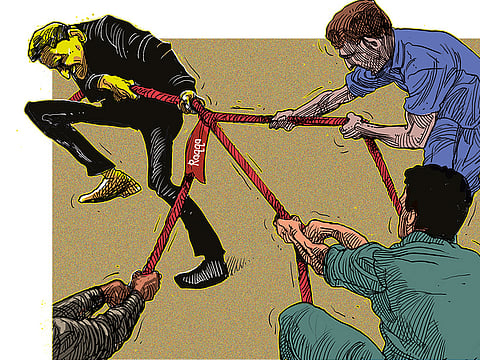Kurds look set to win the scramble for Raqqa
Tehran, Ankara concerned that whoever controls Syria’s east will influence the outcome of the war in the West

The battle to recapture the Daesh (the self-proclaimed Islamic State of Iraq and the Levant) capital of Raqqa in eastern Syria has begun, but there is no consensus on who should take over afterwards. All parties in the fighting see a huge opportunity for a massive land grab in the eastern desert, which in turn will have a significant impact on the future of Syria. The outcome has a major regional geopolitical importance to the various foreign sponsors of Syrian militias. So the battle in Raqqa is being carefully analysed in Ankara and Tehran, as well as in Washington and Moscow, never mind Damascus.
This is why the question of who will plant their flags on the towers and minarets of Raqqa and declare themselves the liberators of Syria from Daesh has become urgent. From amongst the opposition, the Syrian Kurds are the most likely victors with their newly active American allies, but many would like to see other opposition forces from the Arab Sunnis succeed, even though the Americans regard them as too chaotic to make much a job of it. From the Iranian-backed regime side of the civil war, forces of Syrian President Bashar Al Assad are also keen to make their mark in the east and continue to shore up Al Assad’s successes.
Traditionally, Syrian politics has been dominated by what happens between Damascus and Aleppo, and the highly populated territory that lies between the north-south line between these two cities and the sea. The desert in the east has never had much impact on mainstream events. This is why all the attention in the Syrian peace talks has focused on who is talking to whom in Geneva and Astana, and has concentrated solely on the three-(four-, five-)way civil war raging in the west of the country. This process has had nothing to do with the ad hoc international alliance against the Syrian part of Daesh that was ludicrously slow to get going, and only managed to get much coherence when the Americans took a decisive lead. But now, all the combatants recognise that if one party holds the majority of the east, they will be in a significant position to dictate terms in the on-going struggle in the west.
The current winners to gain territory in the battle against Daesh are the Syrian Kurds. Starting from their home territory in the north-east of the country on the Iraqi border close to Iraqi Kurdistan, the Kurds have successfully established a line of territory all along the northern border next to Turkey, which they have deepened to the south in some parts. The Syrian Kurdish militia is the People’s Protection Units, or YPG, which forms part of the umbrella Syrian Democratic forces, SDF, and enjoys American support.
Desperate factionalism
The YPG is the Syrian branch of the Kurdistan Workers’ Party, or PKK, which is the separatist group in Turkey that has restarted its fighting to gain a Kurdish region from the territory of eastern Turkey, which is why the YPG has had direct opposition from the Turkish government that was extremely reluctant to see the YPG make any gains at all. Turkey has sought for Arab Syrian rebel factions to lead the fight for Raqqa, which is a largely Arab city, but they have been rebuffed as the US has relied heavily on the Kurdish fighters, who have more consistent military success and have not fallen prey to the desperate factionalism of the Arab rebel groups.
In recent weeks, the Turks seem to have been forced to relax their position. Last week, when the administration of US President Donald Trump began to supply weapons directly to the YPG, Turkish Prime Minister Binali Yildirim moved his usual fury from the present day to an unspecified time in the future. He warned that his country would “give the required response” if the capture of Raqqa by the YPG ever threatened Turkey’s security.
This is a very different approach from direct and immediate action against the Kurds.
Iran has a deep interest in the result of the Syrian civil war and has invested a fortune in propping up Al Assad, so it also has an interest in what happens in Raqqa. It has every wish to remove Daesh from power, but it also enjoys the current Iran-friendly land route through Iraq and Syria to its allies in east Syria and Lebanon. Therefore, Tehran could try to pre-empt the American-backed coalition by pouring more Iranian resources into Syria and so demand that Al Assad move his forces to retake Raqqa.
Military presence
Tehran has just experienced its first Daesh or Al Qaida suicide bombing, and might decide to use these horrors as a pretext for increasing its military presence in Syria and Iraq to fight Daesh. But the real reason is that Iranian military commanders can see that the American-led coalition’s successes in eastern and southern Syria will hamper the freedom of movement of the Iranian-backed militias across the Syria-Iraq border.
But of course, whoever retakes Raqqa and claims the territorial victory can only really claim a partial win in the complex Syrian civil wars. The war against Daesh will continue as it reverts to being a purely terrorist organisation with no territorial claims at all. Its three years in the sunshine of governing people and lands were a simple opportunistic extra. Its real task remains promoting chaos and anarchy to help topple the government of the Arab world, and it does not need to manage Raqqa’s water and electricity to do that.

